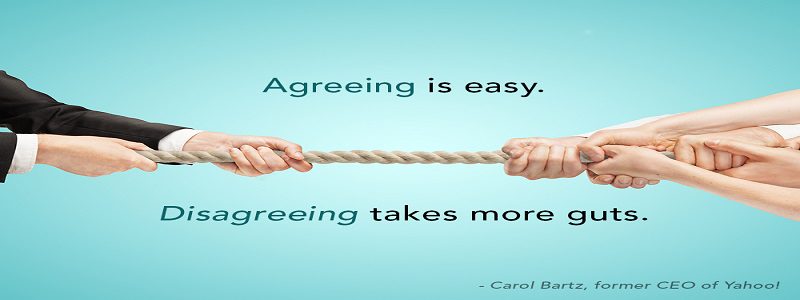
In Praise of Disagreement
One thing that almost everyone can agree on is that there is too much disagreement in America today. The country is polarized and fractious on a whole range of issues, from Donald Trump to social media, trade policy to gender relations, cultural history to classroom curriculum. Sources of information, the status of authority, even facticity itself are subject to rancorous disputation, it seems. And the divisions over issues and identities are straining and tearing at the very social fabric and sense of shared American values that have kept this country from splitting apart through most of its diverse, dynamic 240+ year history.
But what if we are fundamentally misunderstanding and misdiagnosing the present predicament in which we find ourselves? What if instead of this current climate of rancor and hopelessly encamped enmity is sourced not in a super-abundance of disagreement, but rather in our inability to see disagreement as an opportunity for growth, as an indication of the health of a democratic open society, and as a vehicle for syncretic solutions that draw from the best thinking on multiple sides of an issue. What if the current feeling that we have surfeited on contention is disguising the truer condition underneath: that we are distorting debate and civil disagreement and have abandoned the conventions and norms that have made it a fundamental element of democracy and of education for thousands of years.
Writer and columnist Bret Stephens advanced this position in an address he recently gave to the Lowy Media Institute in Sydney, Australia, entitled, “The Dying Art of Disagreement.” Yes, agreement can be community-building, and it is often the peer-induced norm (in business or in the classroom), as Carol Bartz, the former CEO of Yahoo noted. But in disagreement there can be originality, boldness, criticism, the drive to improve.
To say the words, “I agree” — whether it’s agreeing to join an organization, or submit to a political authority, or subscribe to a religious faith — may be the basis of every community. But to say, I disagree; I refuse; you’re wrong; etiam si omnes — ego non — these are the words that define our individuality, give us our freedom, enjoin our tolerance, enlarge our perspectives, seize our attention, energize our progress, make our democracies real, and give hope and courage to oppressed people everywhere. Galileo and Darwin; Mandela, Havel, and Liu Xiaobo; Rosa Parks and Natan Sharansky — such are the ranks of those who disagree.
Disagreement that serves these noble and virtuous ends has observe a means that is commensurate with these ends. It has to be civil, with discourse that is considerate and respectful. It has to be evidence-based, since rationality is prerequisite for progress. It has to be constructive and it has to have integrity – purposed for positive change and accepting of what philosopher Karl Popper called the principle of falsifiability (there must exist reasonable conditions under which you would have to accept that your position is wrong).
With these conditions in place, disagreement can be the most valuable expression in a society. But how do we achieve the restoration of these conditions. Bret Stephens suggests that journalism has a crucial role; Thomas Jefferson would have agreed (“Where the press is free, and every man able to read, all is safe,” said Jefferson, in 1816). But Stephens places even greater weight on education (and here too, Jefferson would likely have assented). What Stephens says in his address he learned most of all in his education at the University of Chicago was the art of disagreeing and debating the most weighty ideas in the texts he studied.
To disagree well you must first understand well. You have to read deeply, listen carefully, watch closely. You need to grant your adversary moral respect; give him the intellectual benefit of doubt; have sympathy for his motives and participate empathically with his line of reasoning. And you need to allow for the possibility that you might yet be persuaded of what he has to say. . . . For free societies to function, the idea of open-mindedness can’t simply be a catchphrase or a dogma. It needs to be a personal habit, most of all when it comes to preserving an open mind toward those with whom we disagree.
Historian Robert Conquest felt that the open mindedness necessary for and indeed intrinsic to the habit of mind that is formed through debate as a regular part of learning, and through cultivated skills of argumentation, was essential to staving off the threats of totalitarianism, which always and everywhere seek to close down dispute and disagreement.
Totalitarianism, which appears to be the rational, ordered form of society, contains greater elements of irrationality than does civic culture . . . because civic culture contains the element of debate and argument . . . . The totalitarian state contains within itself all of the elements of a more extreme irrationality: the elimination of real debate and criticism.
Conquest – like Jefferson, like Stephens – looked to the education system to cultivate, nurture, and normativize the habits of mind of argument, which fundamentally means civil and evidence-based disagreement. Those of us in education should be considering deepening our commitment to the art of disagreement – of argument, of debate – not turning away from it, at this crucial time in our country’s history. The values we strive to achieve in our classrooms should be academic ones, but they should also be civic ones. Argumentation – in its right and proper and best form – advances both.

